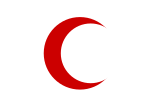The Syrian Arab Red Crescent (SARC) (Arabic: الهلال الأحمر العربي السوري Al-Hilal al-Aḥmar al-Arabi al-Souri) is a humanitarian nonprofit organization. Its headquarters are in the Syrian capital city of Damascus. The society was founded in Damascus, Syria in 1942, and admitted to the International Committee of the Red Cross (ICRC) in 1946. Some of founders included were Abdul-Kader Zahra, Jamil Kabara, Sami Al-Meedani, Shafiq Diyab, Mustafa Shawky, Ahmed Kadary, Wade Saydawy, Mounib Rifai, and others. The society is part of the International Federation and has been recognized by the ICRC. The SARC has 14 branches all over Syria and 75 sub-branches. Volunteer based, the SARC has around 11,000 trained volunteers that work in the areas of first aid, first aid training, disaster response and relief, psycho-social support, and health in general. SARC also partners with local charity organizations and works with the relevant components of the Syrian community, with UN agencies and NGOs.
 Flag of the Red Crescent | |
| Abbreviation | SARC |
|---|---|
| Formation | 1942 |
| Type | Non Profit Organization |
| Legal status | Foundation |
| Purpose | Humanitarian |
| Headquarters | Damascus |
Region served | Syria |
| Website | www.sarc.sy |

The organization is working in the Syrian civil war and is engaged in evacuation of people from war torn region to other places.[1] It is shifting people and militants who surrender and relocating them to other places. When Darayya surrendered to government forces, the militants were relocated by the Red Crescent.[2]
SARC volunteers and hospitals have been the targets of numerous attacks since the beginning of the Syrian civil war.[3][4][5][6][7][8] In 2016 a UN aid convoy composed mostly of SARC workers driving near Urum al-Kubra was bombed, killing at least 12 SARC drivers and destroying aid supplies in a warehouse.[9][10] According to the ICRC 20 civilians were also killed in the attack.[10] UN Secretary General Ban Ki-moon condemned the attack and temporarily suspended UN aid convoys after the attack.[9][10] A UN investigation carried out by the Independent International Commission of Inquiry on the Syrian Arab Republic found that the Syrian government deliberately carried out the attack on the aid convoy which they allege amounts to a potential war crime.[11]
See also
editReferences
edit- ^ Hubbard, Ben; Saad, Hwaida (2017-04-14). "More Than 7,000 People Evacuated From 4 Besieged Syrian Towns". The New York Times. ISSN 0362-4331. Retrieved 2020-03-01.
- ^ "Darayya siege: Residents and fighters ready to evacuate Syrian town - BBC News". BBC News. 2016-08-26. Retrieved 2016-08-26.
- ^ Borger, Julian (2016-09-20). "US blames Russia after UN aid convoy in Syria targeted by air attack". The Guardian. ISSN 0261-3077. Retrieved 2020-03-01.
- ^ "IFRC joins Syrian Arab Red Crescent in mourning death of volunteer in Al-Tabaqa". International Federation of Red Cross and Red Crescent Societies. Retrieved 2020-03-01.
- ^ AFP (2017-02-09). "Syria rebel fire kills three in Red Crescent centre: monitor". Al-Monitor. Retrieved 2020-03-01.
- ^ Barnard, Anne (2013-06-03). "Rushing to Aid in Syrian War, but Claiming No Side". The New York Times. ISSN 0362-4331. Retrieved 2020-03-01.
- ^ Fahim, Kareem; Erlanger, Steven (2012-01-25). "Syria Chaos Claims Priest and an Aid Group Official". The New York Times. ISSN 0362-4331. Retrieved 2020-03-01.
- ^ Cumming-Bruce, Nick (2017-03-14). "Syrian Military, Not Rebels, Severed Damascus Water Supply, U.N. Finds". The New York Times. ISSN 0362-4331. Retrieved 2020-03-01.
- ^ a b "US claims Russian warplanes bombed Syrian Arab Red Crescent aid convoy and warehouse". The Independent. 2016-09-20. Archived from the original on 2022-05-26. Retrieved 2020-03-01.
- ^ a b c Joe Sterling; Angela Dewan; Joshua Berlinger (20 September 2016). "UN chief calls convoy attackers in Syria 'cowards'". CNN. Retrieved 2020-03-01.
- ^ Cumming-Bruce, Nick; Barnard, Anne (2017-03-01). "U.N. Investigators Say Syria Bombed Convoy and Did So Deliberately". The New York Times. ISSN 0362-4331. Retrieved 2020-03-01.